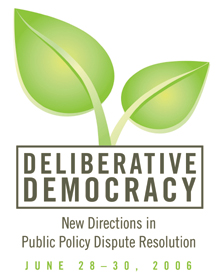 |
EPP Conference 2006This page is a summary of my session at the "Deliberative Democracy" conference, organized by the Environmental and Public Policy Section of the Association for Conflict Resolution. The session was co-hosted with with Dr. Shizuka Hashimoto (JSPS Fellow at DUSP, MIT). The conference was held at MIT (Building E51) on June 28-30, 2006. |
The following is a summary description of our session.
MODIFYING "IMPORTED" ENVIRONMENTAL CONFLICT RESOLUTION TECHNIQUES IN JAPAN
We will
start the discussion by focusing on the traditional ways in which deliberative
democracy is used in Japan to resolve public disputes: the cho-nai-kai
system. Unfortunately, these traditional ways of resolving environmental
conflicts are not working very well anymore, in part because they do
not involve the full range of relevant stakeholders. The session will
then examine an experimental use of "consensus building" techniques
in Japan. Close examination of this case illustrates the need for process
adaptation and organizational change in instances of cross-border borrowing
of dispute resolution techniques. Then we will ask participants to address
questions such as, "What is the best strategy for an international
dispute resolution practitioner (from the west) to use when working
in an Asian context?" and "How ethical it is to export ideas
and techniques that might change the way people make public policy decisions?"
Presentation Slides
- Matsuura, M.: Exporting Consensus Building to Japan: What's lost in translation?
- Hashimoto, S.: Legitimacy by Tradition: Japanese model of Deliberation.
- Matsuura, M.: Kita-josanjima Intersection Improvement Process: The first experiment of “importing” consensus building processes to Japan.
Summary by the organizer (Direct link to a conference web page).
Summary (MS-Word Document)
Reactions from the audience
What is the best strategy for an international dispute resolution practitioner (from the west) to use when working in an Asian context?
- Experiment a few more times. Then determine if good change is possible.
If there is hope--continue. If not, rethink.
- When working in a foreign context, partnership with a local practitioner
seems critical to assess whether D-R practices are appropriate, and
if so, how to adjust these practices to local needs, conditions requirements.
- Work with domestic partners to build capacity and transfer technology (both ways).
- Honor customs and be always mindful not to push anyone in a corner
or to lose face---embarrass one person and (s)he will be disillusioned.
- How receptive are the neighborhood associations to outside influences in their organizational structure?
How ethical it is to export ideas and techniques that might change the way people make public policy decisions?
- I think this is a difficult question with no "cookbook"
answer. My intuitive sense is to seek some incremental but not jarring
change. Good session!
- Instead of importing ideas, would it be better to adapt existing
methods to changing times.
- "Do No Harm" should remain the overriding ethical concern.
If consensus building (western style) is done in ways that undermine
the family unit and further erodes social bonds, then it should be
adapted. I was impressed with how the Kita-josanjima process was conducted.
- Is it ethical to involve community leaders (to circumvent local
opposition) if they are not truly representative of local interest?
- Ethical if new ideas supported by community, if there is buy-in.
Other comments:
- In future, how involve women and young people in Joint Neighborhood
Association decisions?
- Was it a change for the transportation Ministry to agree to "respect"
the locally made decision? Dis the Ministry legally bind itself to
the local decisions?
- How do the stakeholder dialogue participants get chosen? By who? How to be sure that they are being chosen neutrally?
Thank you very much for everyone who joined our session. We can be reached at:
- Masahiro Matsuura: masa (at) mmatsuura.com
- Shizuka Hashimoto: zennist (at) mit.edu
